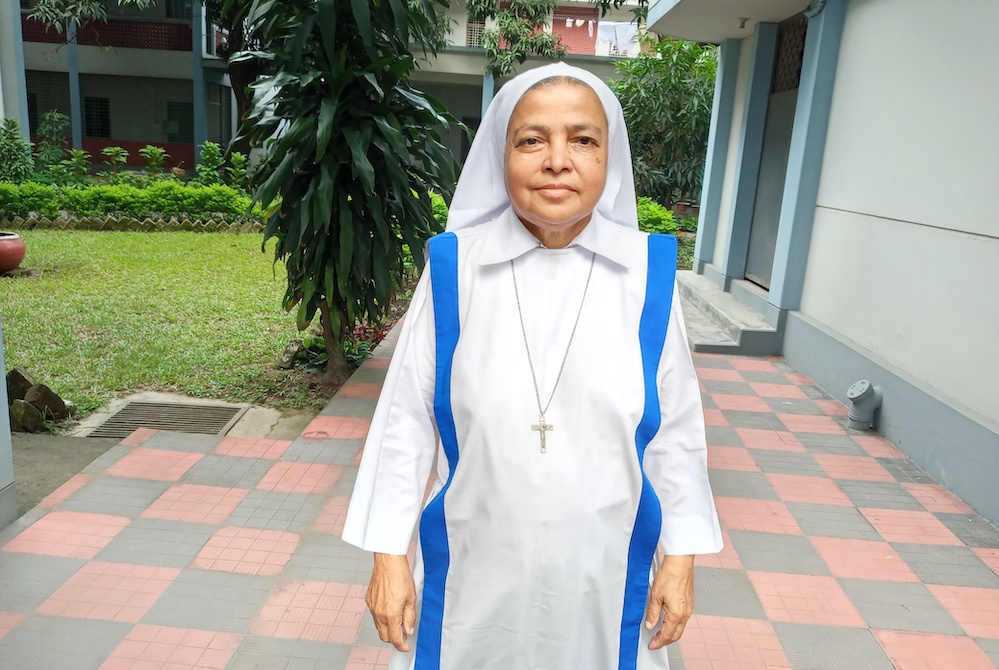
Sr. Mary Nibedita is pictured outside at the Associates of Mary, Queen of Apostles convent Mary House in Dhaka, Bangladesh. (Sumon Corraya)
Sr. Mary Nibedita, member of the Associates of Mary, Queen of Apostles in Bangladesh, has been working as a nurse for 42 years after 10 years as a teacher. She enjoyed both ministries, but the 74-year-old nun has been recognized for serving in the health sector: In 1990, she received the Best Nurse Award from President H.M. Ershad.
She said she has been blessed with enormous love, respect and trust from people for her dedicated service as a nurse in various non-Christian hospitals. She has continued her work as principal of the nursing institute of Universal Medical College and Hospital in Dhaka through the pandemic.
The Associates of Mary, Queen of Apostles is a local congregation with 132 nuns working in catechesis, teaching, health care and women's empowerment.
Nibedita spoke with Global Sisters Report about her life's story and the present state of health care in Bangladesh.
GSR: How did you join the nursing profession?
Nibedita: I had been successfully serving in a school as a teacher. One evening, my congregation's superior general told me she wanted me to join in nursing training. In our congregation, other nuns obtained nursing training after they expressed their desire to be a nurse, but our superior general ordered me to take this course, so I took an admission to take courses in nursing. It was not a happy moment, leaving teaching ministry, because I had been enjoying good days as a teacher, with love for my students.
When I started nursing classes, I saw that 10 of my former students had also joined me in nursing training. In 1979, I finished training at state-run Mymensingh Medical College and Hospital, situated in Mymensingh, 115 kilometers [71 miles] from Dhaka.
After I finished my studies, I worked there at the college because my contract with the nursing section of the college required me to stay for three years as a nurse. Later, I joined Dhaka Children's Hospital, where I worked a nurse and matron until 2004. I currently work as principal at Universal Medical College and Hospital, which has 350 students.
Advertisement
How do you do pastoral work through your nursing ministry?
I am very dedicated in my nursing profession. Sincerity, faithfulness and love for all patients are key characteristics of my nursing profession. I teach my students to follow these virtues.
Our nursing institute has gained some fame because we produce quality nurses. Our former students are working in various noted hospitals in the country. When I worked in different hospitals, younger doctors learned from me.
When I worked as a nurse, I saw members of the hospital staff steal medicine. I told them, "Please don't steal these. These are allocated for the patients. If you need them, please tell me. I will buy them for you from my salary." This is how I stopped these kinds of acts in the hospitals.
I listen to patients' needs sincerely and do good behavior. Sometimes, coworkers protest for a raise in their salaries by not doing work, but I couldn't do it as a religious. In those times, I managed twice the number of patients.
Additionally, even though I am a religious nurse, the hospital's Muslim leadership trusts that I will fulfill their requirements aptly. Our students are also famous for their service.
Being a nun, wearing a cross and nun's dress, what kind of challenges do you face in this Muslim-majority country at your workplace?
Amazingly, all people respect me in my cross and nun's dress. People of other faiths think it is the dress of nurses. Additionally, I have goodwill because I am a skilled and honest nurse.
When I worked in Dhaka Children's Hospital, an autonomous hospital, I was asked to work with all foreign patients, as I can speak English. Instead of facing challenges, I got support from the hospital leadership and other Muslims.
Being a Christian and nun, I never face any challenges. Hospital leadership told me to help stop corruption in the hospital, and I responded accordingly. My co-workers call me didi [elder sister].
If any female nurse was sexually harassed by a male doctor, they ask for my help, and I stand beside them. I faced these cases and successfully solved them. Hospital leadership gave me support to solve these challenges.
Sr. Mary Nibedita of the Associates of Mary, Queen of Apostles does a demonstration about taking care of newborns with her students from the Universal Medical College and Hospital.
If anybody came to the hospital for an abortion, how did you handle it?
As I do my duty as a nurse in a hospital, sometimes, people come for an abortion. I protest these immoral acts. I tell them, "Please don't have an abortion." Some of them hear me. Some of them don't.
We teach women that they don't have the right to kill an innocent life through abortion. Sometimes, I faced barriers and I was denounced, but for my strong morality I won the hearts of most of the people. Although abortion is legal in this country, religious values teach us not to kill a life. I use religious sentiment to stop abortions. Most of the time, I am successful. I get respect.
In your nursing ministry, how do you share the teachings of Jesus Christ?
I share them through my work and lifestyle in my service. I take care of those who are needy patients who couldn't afford treatment. Many times, I help them with money from my salary to get treatment. To see good and kind work, they can understand that I am a Christian. This is how people of other faiths can understand I am a Christian.
How did you discover your religious vocation in your life?
I am the youngest daughter in our family, and I was very close to my parents and family members. During my childhood, I was involved in cultural activity. I can play various musical instruments. I played in religious drama with my family members.
When I was 15, my father and fraternal uncle arranged a marriage. A teacher at my school, which was run by a nun from the Associates of Mary, Queen of Apostles, called me to their home. I went there, and they told me that they learned my father had arranged a marriage. To stop child marriage, they didn't return me home. My father became angry with the sisters, but the nuns didn't leave me to my parents.
Later, I studied, staying at convent, and after I completed secondary school, I entered the congregation to be a nun. I liked the life of the nuns. These nuns helped the needy, were involved with teaching and women's empowerment, which attracted me in the life of religious. God was beside me. That is why I have completed 50 years last year in my religious life. My prayerful life helped me make my religious life joyful. I thank God that I am a happy nun.
Sr. Mary Nibedita of the Associates of Mary, Queen of Apostles poses with her nursing students of Universal Medical College and Hospital. (Provided photo)
What is the situation of the health care sector during the COVID-19 pandemic?
The health care sector in Bangladesh is not much well. During the pandemic, where developed countries have struggled to provide better treatment, as a poor country, [Bangladesh's] state-run hospital situation is not good. Patients do not like to go to state-run hospitals because they do not get better treatment. Patients get good treatment from some church-run hospitals. To make money, the number of private hospitals has been increasing everywhere, but the standard of their treatment is not satisfactory.
Some hospital leadership writes to me to send Christian nurses for their hospitals to work, so Christian nurses are in demand. Some Muslim nurses who attended my nursing school are also devoted in their workplaces.
The hospital where I work takes care of COVID-19 patients. Because of my age, I cannot enter the rooms of COVID-19 patients, but my students do work there. People have been changed during this pandemic. Many of them don't want to look after people who have COVID-19. I advised my students to give extra care to them. It is health care work. We jointly should beat this virus.
[Sumon Corraya is a Catholic journalist based in Dhaka, Bangladesh. He covers issues affecting the Christian community in Bangladesh.]







